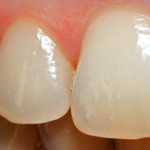 If you take good care of them, your teeth can last a lifetime.
If you take good care of them, your teeth can last a lifetime.
Nowadays, we know that brushing, flossing, and rinsing teeth—as well as regular visits to the dentist and dental hygienist—can help protect our pearly whites. Yet we may not realize that many dental products now focus on strengthening and protecting tooth enamel. Your dentist and hygienist will also evaluate it during check-ups.
So why is tooth enamel so significant?
TOOTH ENAMEL: BASIC FACTS
Tooth enamel is the visible, surface layer of the tooth. It covers the crown and protects the soft, inner tooth tissue below.
- It is the hardest, most highly mineralized substance in the human body. Because enamel has no living cells—and thus no nerve cells—it cannot heal itself. And although it is extremely tough, it can become brittle and eventually, fracture. Your body cannot repair chipped or cracked enamel.
- It is semi-translucent, so you can see through it. Tooth enamel’s natural color ranges from light grey to grayish white. The “whiteness” of your teeth isn’t due to the enamel but rather to the dentin, the supporting structure below. The dentin’s natural hue–whether it is white, off-white, grey, or yellowish–strongly affects the appearance of your teeth.
As a tooth becomes stained or damaged, however, the enamel surface itself can become discolored, thereby altering a tooth’s appearance.
- Your tooth enamel can last a lifeline—and beyond. Or it can disintegrate while you are still alive.
How Enamel Helps Protect Our Teeth
- Tooth enamel is the first line of defense against tooth decay; it shields the rest of the tooth from encroaching bacteria.
According to the American Dental Association, bacteria start attacking teeth within 20 minutes of eating or drinking, and the assault begins against the tooth enamel. But because enamel is so hard and made up of incomparably tight mineral bonds, bacteria have a hard time penetrating the living tooth.
- Tooth enamel also helps protect your teeth from daily use such as chewing, biting, crunching, and grinding.
- And it insulates the teeth from potentially painful temperatures and chemicals.
KEEP YOUR TOOTH ENAMEL HEALTHY
In spite of its toughness, everyday acids that develop from plaque, and from certain foods and drinks–particularly those that are sweet or contain starch—can endanger your enamel. Acids can attack and soften the tooth surface, leading to cavities or fractures. Indeed, some acids in fruit drinks are more erosive than battery acid.
When tooth decay gains entry into the hard enamel, it has access to the main body of the tooth. The most vulnerable points for entry are the deep grooves, pits, and fissures of enamel, where a toothbrush cannot reach. These locations are excellent hiding places for bacteria.
Follow These Tips:
- Drink fewer soft drinks, fruit juices, sports drinks, energy drinks, flavored waters (with added sugar), Kool Aid and all other sugary drinks. Cut way back on candies, sweet treats, and sour candies (the worst offenders). The most significant cause of tooth decay is sugar consumption.
Remember that contrary to popular belief, the most critical factor is not the amount of sugar consumed but the frequency. So avoid frequent grabs at the candy jar during your workday.
- Physical wear and tear of the tooth surface is called abrasion. For example: brushing teeth too hard, improper flossing, biting on hard objects (such as fingernails, bottle caps, or pens), or chewing tobacco. To protect your tooth enamel, avoid or stop these habits.
- Order a custom-fitted mouth-guard if you clench or grind your teeth. This habit, which often happens involuntarily while sleeping, is a condition known as bruxism. It can cause destructive and irreversible damage to the enamel very quickly.
- Be aware that tooth enamel corrodes when highly acidic contents hit the tooth surface. This can occur with certain medications like aspirin or vitamin C, highly acidic foods, and frequent vomiting from bulimia or alcoholism.
- Keep your mouth from drying out during the day. A wash of saliva around the teeth helps keep the mouth clean, prevents decay from forming rapidly, and provides needed moisture for gum tissue. Various medications, such as decongestants and antihistamines, dry up saliva. Drinking a glass of water will help moisten your mouth.
- Use a fluoride rinse: fluoride has been proven to hinder the growth of cavity-producing bacteria.
And finally, a note about appearance: reduce exposure to substances such as coffee, tea, cola, red wine, and tobacco, which can cause internal staining on your enamel. Over time, your teeth can become discolored and appear darker or more yellow overall. Once this occurs, you might want to consider teeth-whitening products.
